Clea Simon's Blog, page 21
May 21, 2020
#NoContact Book Tour with Ira Robbins
I’ve been trying to remember when I first heard the name “Ira Robbins,” and I can’t. Ira was one of those writers I trusted to steer me toward music I would love – and wouldn’t hear about anywhere else. When I started writing about music, he was one of the few I admired – someone who could translate the experience of a live performance onto the page. When I heard he had a novel coming out – a music-related one, no less – I knew I wanted to host him. I’m sorry that we can’t meet on a real book tour right now, but please raise a glass and welcome Ira Robbins to the #NoContact Book Tour!
Tell us about your book!
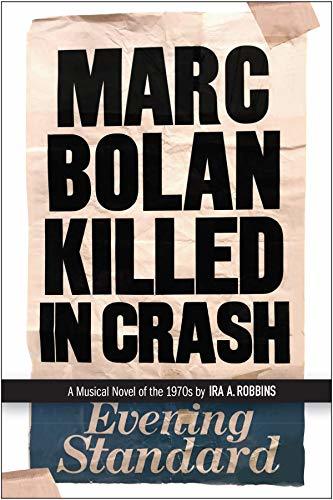
Marc Bolan Killed in Crash is a historical fantasy about the glam-rock scene in London in 1972. The central character, Laila Russell, is a 15-year-old schoolgirl who inadvertently gets pulled into the world of British rock star Chaz Bonapart, whose manager is seeking a solution to his creative doldrums and waning career. His radical notion is to get a representative of the target audience (teenaged girls) to report back on what subjects her peers would respond to in song.
That arrangement leads much further than Laila could ever imagine, and she winds up with a rock career of her own.
My goal here was fourfold: to immerse myself in a musical culture emerging in a particular time and place, to explore complex questions of creativity, originality and inspiration in the world of pop songwriting and commerce, to depict the loss of innocence and idealism success brings and to indulge a lifetime passion for dialect, slang and accents.
A few bits and pieces here are based on things that happened to me, and several fictional characters were created with real people in mind. Other than the stuff I made up, the historical details are as accurate as I could make them.
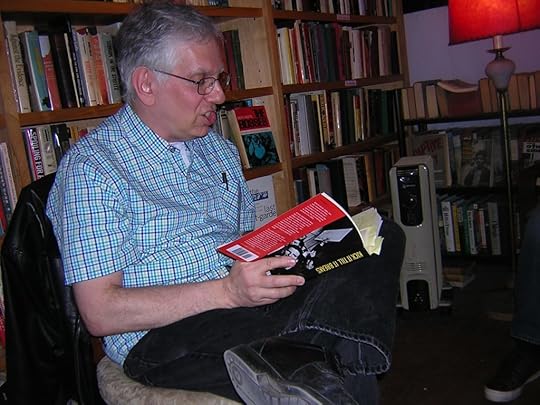
What would you have been doing now to promote it? Where would you have been speaking? What bookstores would you have visited? (Feel free to add links!)
I did a couple of readings as a work in progress, which was encouraging, but as I have had to self-publish this novel (my second), and did so during the plague, I did not yet have any plans to promote beyond social media. So this is my first public outreach.
The book is only available as an E-book and print-on-demand paperback from Amazon.
Here’s the link: https://amzn.to/2WnRS0M
Are you working on anything now? Is your process or routine different?
I am deep into a memoir-cum-anthology of my music journalism, which I hope to publish as an E-book sometime this year. It’s going to be very long and contain illustrations of my work as well as memorabilia from my career.
I am also preparing to relaunch the Trouser Press website (trouserpress.com) as an archive of the magazine’s existence (1974 – 1984) and as a forward-looking online music magazine.
I have the earliest stirrings of a third novel, to be set in New York City (my home and birthplace) in recent times.
Do you think your writing will be changed by this crisis?
No, I don’t expect so. I’ve never written fiction about current events and don’t intend to change.
What’s the first thing you’re going to do when we’re free to be social again?
Get back to walking the streets of my city. I retired from a radio job after 22 years in January and was just getting used to the freedom of roaming freely when lockdown began. So I would like to resume that. Ironically, I’ve been much more productive under the enforced quarantine (possibly because my wife has had to work from home as well, and we stopped going out to eat or see friends, so I am never far from my desk.)
May 20, 2020
Reviewing “Rodham” – if only…
This ran in Sunday’s Boston Globe with a gorgeous illustration (not available online):
BOOK REVIEW
New novel ‘Rodham’ imagines Hillary without Bill
By Clea Simon Globe Correspondent,Updated May 14, 2020, 2:30 p.m.
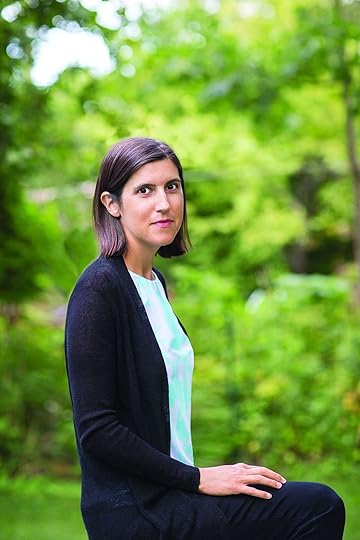 Author Curtis SittenfeldJOSEPHINE SITTENFELD
Author Curtis SittenfeldJOSEPHINE SITTENFELDSmart, engaging, and heartbreakingly plausible, Curtis Sittenfeld’s “Rodham” posits a world in which Hillary Diane Rodham never married William Jefferson Clinton but instead went on to pursue her own political career decades earlier than the onetime presidential candidate did in real life.
This speculative work, Sittenfeld’s sixth novel, takes off on a statement in the former secretary of state’s memoir “What Happened,” in which Clinton recalls that her husband asked her twice to marry him, and that twice she declined before, of course, ultimately accepting. Like Sittenfeld’s 2008 novel, “American Wife,” which was loosely based on former first lady Laura Bush, “Rodham” is told as a first-person reminiscence. But “Rodham,” like its namesake narrator, is the sharper book by far, depicting the realities of American politics as well as an astute portrait of the candidate who, we should remember, did win the popular vote.
Advertisement
From the start, the Hillary whom Sittenfeld envisions has a prescient understanding of her ability to lead as well as its potential costs. Addressing her Wellesley commencement, as the real Clinton did in 1969, she feels “a sense of my own competence blended with the knowledge that I was about to pull off a feat most people thought, correctly or not, they couldn’t” as well as “the loneliness of being good at something.” These combine to give her a taste of what to expect: “My own singular future.”Get HomeFront in your inboxThe Weekender is temporarily HomeFront, your guide to the best ways to stay entertained at home any day of the week.Sign Up
This Hillary has already received early lessons in the obstacles she will face. At a friend’s 10th birthday party, she recalls, the celebrant’s father told her, “You’re awfully opinionated for a girl.” This incident — also used in Sittenfeld’s 2016 short story about Clinton, “The Nominee” — sets the tone for the protagonist’s interactions with men. Even when she meets Bill, whom she believes to be her soul mate, he not so subtly reinforces the message that she cannot be both a woman and an independent thinker.
Divided roughly into three parts, Sittenfeld’s political fantasy starts with that commencement speech and convincingly reimagines Hillary and Bill’s courtship at Yale Law School through their move to Arkansas. So credible that it’s almost agonizing, this first section gives us the smart but insecure woman swept off her feet by the charismatic womanizer. In stark contrast to her early romantic disappointments, Bill appears to adore her body and her mind equally, promising Hillary everything she ever wanted. Until, that is, he doesn’t.
When Hillary breaks up with Bill, following a series of traumatic revelations, the book shifts into speculative territory — envisaging a career track for Hillary that involves both advocacy work and her own first ventures into the political arena. While these are logical and fully fleshed, playing out the inevitable conflicts between her early idealism and her ambitions and drawing on interviews and Clinton’s own writings, this makes for the driest part of the book. Hillary always was a policy wonk, and Sittenfeld evokes her smart, detailed voice for good and ill.
The action picks up again in 2015, as Hillary launches what in this fictional world is her third campaign for the presidency — and finds herself competing for the Democratic nomination with Bill. In an utterly believable turn, her ex (who has spent the intervening years amassing a fortune in Silicon Valley) has become a populist in the mode of Donald Trump. Although a liberal-centrist in his policies, he’s not averse to playing on the sexism of the crowd. After Bill astutely attacks his opponent for her strengths — particularly her use of “complicated terms” when she’s discussing economics — chants of “Shut her up” become regular campaign features.
Trump himself, still merely a television celebrity in this retelling, figures into the increasingly fraught dynamics. Sittenfeld repurposes the racist comments from Trump’s campaign launch statement, creating a credible alternative role for our 45th president in which he mulls whether to enter the race and opts instead for the role of kingmaker, tweeting about “Hardball Hillary” and “Cheatin’ Bill.” As Hillary considers enlisting the blowhard businessman as a spoiler, Sittenfeld has a campaign official muse in what must be the book’s darkest joke: “I wonder if this is the part in the movie where the scientist spills the teensiest bit of radioactive slime,” she says.
Repulsed by Trump’s “smug, acrid jitteriness,” Hillary is nonetheless willing to consider that risk. A seasoned politician by this point, she is also increasingly circumspect — especially about Bill. “The reason he shouldn’t be president isn’t that he’s vegan,” she says to her campaign crew in a rare moment of candor. “It’s that he’s a sexual predator.” Aware of the import of this revelation, and of possible repercussions — her long silence about a long-ago incident makes her vulnerable to charges of complicity — she previously hadn’t dared voice this thought in public. She barely admits it to herself. It’s the genius of Sittenfeld’s prose that we come to understand this ambivalence, as well as the deep conflicts in this complicated character. In the longing and loneliness, the anger as well as ambition, this Hillary makes “Rodham” a compelling portrait of a future that might have been.
RODHAM: A Novel
By Curtis Sittenfeld
Random House, 432 pp., $28
Clea Simon is the author of “An Incantation of Cats.” She can be reached at www.cleasimon.com .
May 18, 2020
“Up From the Streets” – NOLA music on film
In a better world, I’d be just back from New Orleans. Every spring since 1989, I’ve attended at least one weekend of the New Orleans Jazz and Heritage Festival (Jon has joined me since 1993). This annual festival — always the last weekend in April and the first in May — has, since 1970, celebrated not just the namesake music but also, truly, the heritage. With its mind-boggling array of food booths, crafts, and demonstrations packed onto the Fair Grounds Race Course, the event presents this multicultural city in a nutshell. Despite the usual gripes — the crowds have grown too big, too many headliners have nothing to do with the Crescent City (this year would have brought The Who), the ticket prices have gone up astronomically — it’s still reliably wonderful, and I was always happy to pack in with the something like 200,000 annual visitors. Until, of course, we couldn’t.
Because even before we grabbed another bowl of Prejean’s awe-inspiring pheasant, duck, and andouille gumbo, the Fest, as it’s known, always offered, along with those international superstars, an across-the-spectrum selection of New Orleans music. There was trad jazz in the Economy Hall tent, zydeco on the Fais Do Do stage, brass bands, jazz, and blues. Over the past few years, we’d grown used to starting our day with whatever Mardi Gras Indian gang was opening at the Jazz and Heritage stage and taking it from there.
That absence makes the release of Up From the Streets bittersweet. This 104-minute film, directed by Michael Murphy with four-time Grammy winner Terence Blanchard as executive producer, music director, and host, should have been on the film festival circuit this spring. Already the recipient of the Documentary Feature Award of Excellence at the Indie Fest Film Festival and the Juried Gold Award Winner for Best Feature Documentary at Houston WorldFest Film Festival, it is currently available as part of a virtual festival through May 21 to stream, for a fee of $12, part of which goes to support the New Orleans Jazz & Heritage Foundation’s Jazz & Heritage Music Relief Fund and part of which goes to the cinema that would have screened the film. (Viewers, who have 72 hours to watch the film once they have purchased it, have such options as Provincetown’s Waters Edge Cinema or the Amherst Cinema.) …
Full review in the Arts Fuse (no paywall!): https://artsfuse.org/202931/music-doc...
May 8, 2020
Reading While Distracted
Librarian and blogger Lesa Holstine has started a wonderful series for the independent Poisoned Pen Bookstore, asking authors what we’re reading in these strange times. Today was my turn.
I’m sharing the entire post below. If you’d like to see the others, from authors such as Jenn McKinlay, Krista Davis, and Reece Hirsch, just scroll down from here.
Clea Simon’s Distractions
POSTED ON MAY 8, 2020 UPDATED ON MAY 7, 2020
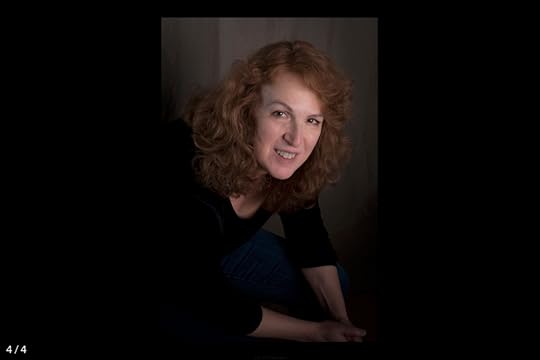
Clea Simon has been doing a little heavier reading than some of us, as you’ll discover when you read her book “Distractions” piece. A former journalist and music critic, Clea Simon wrote three nonfiction books, including the Boston Globe bestseller The Feline Mystique (St. Martin’s), before turning to a life of crime (fiction). Her more than two dozen mysteries usually involve cats or rock and roll, or some combination thereof. A native of New York, she moved to Massachusetts to attend Harvard and now lives nearby in Somerville. She is the author of the Dulcie Schwartz, Theda Krakow and Pru Marlowe pet noir series, as well as the Blackie and Care series, and now the Witch Cats of Cambridge mysteries. Look for Simon’s books in the Web Store, along with the books she’s suggesting. https://store.poisonedpen.com/
*****
Thanks for having me, Lesa. What a strange time we’re living in. But even if we’re stuck in our homes for the foreseeable future, we can still escape through books. For me, that escape has meant focusing on comfort reads – re-visiting the adventures I know well – and catching up on old friends. The theme of protagonists dealing with hardship seems to resonate right now. So while others may lean toward cozies, I’m finding myself going for more adventurous (if still familiar) fare. The first book I found myself reaching for, once my reading time was my own, was Mary Stewart’s “The Crystal Cave.”
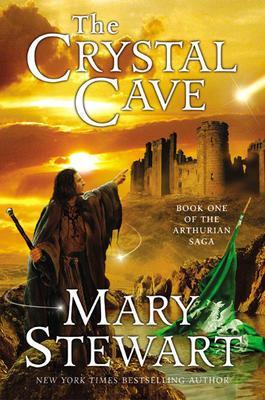
Her retelling of the Arthurian saga from the point of view of a Welsh wizard named Myrddin – or “Merlin,” as he comes to be known – just hits all the right notes of hero-overcoming-adversity, gallantry, and magic. Stewart is the master of adventure. While this trilogy lacks her usual swashbuckling romance she offers a fully realized portrait of a young hero discovering his own powers and also his way in a treacherous world. What could be better? (I’m not sure if I’ll re-read the rest of the series – “The Hollow Hills” and “The Last Enchantment,” however. Might be too sad!)
The book I was reading as this all came down was very different, but utterly absorbing: Hilary Mantel’s “The Mirror and the Light.”
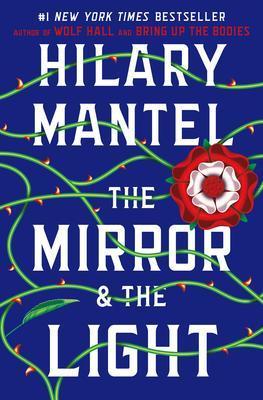
I’ve long been a huge Hilary Mantel fan, though I prefer her big, dense novels (“Beyond Black” and “A Place of Greater Safety”) to her spare, arch books (like “Every Day is Mother’s Day”). I considered myself incredibly lucky , then, to be asked to review “The Mirror and the Light,” which came out in March, for the Boston Globe. The only problem? There were no advance reading copies – the uncorrected manuscripts that usually give critics a head start. Instead, we were given finished copies. But since this was considered a “big book,” meaning editors wanted their reviews to run on or just before publication date, that meant less than a week to read and formulate a review– and the novel ran more than 750 pages.
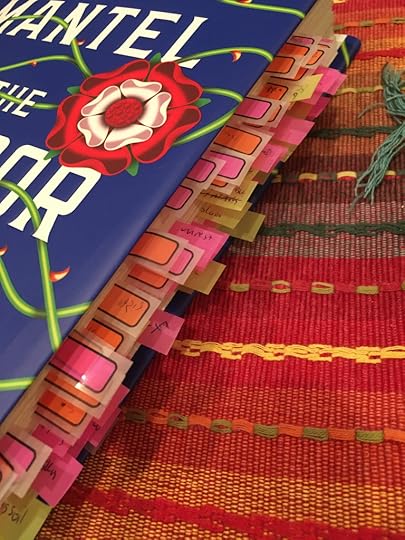 Noted passages for a book review
Noted passages for a book reviewReader, I did it. From the moment of waking to the time I dropped off, for five days, I lived and breathed “The Mirror and the Light.” I must say, I loved every minute of it. This book – the conclusion of her epic Thomas Cromwell trilogy –is vibrant and evocative, and Mantel’s writing just grabs you. Although Cromwell lived in the 16th Century (he was, for a time, Henry VIII’s chief adviser), this first-person retelling of events from Anne Boleyn’s beheading on reads like a contemporary political thriller, with characters walking the tightrope between favor and disaster. That said, it is also filled with the kind of references that I adore chasing down. (I lost more than an hour researching a reference to “the Mouldwarp King,” one day.) Now my husband is reading my copy, and I’m debating whether to give the massive tome a leisurely re-read or to go back to “A Place of Greater Safety,” my favorite of her books. (That one re-visits the impetuous group of young lawyers who kick off the French Revolution…)
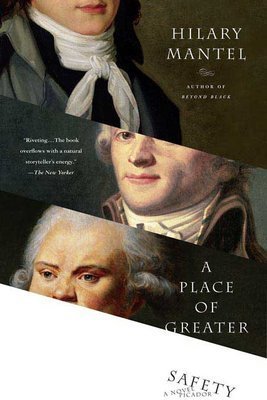
Of course, I may just return to a newer favorite – C.S. Harris’s Sebastian St. Cyr series. The 19th Century Viscount’s latest outing, “Who Speaks for the Damned,” is just out, and I am waiting with bated breath.
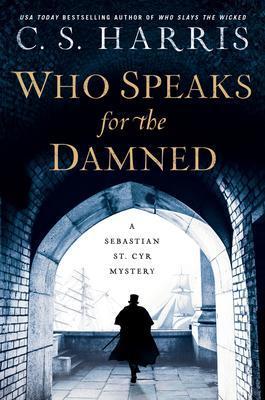
I think scary times are best enjoyed centuries later, and I’m dying to see how Sebastian solves the murder of a transported nobleman. Yes, I think it’s time for a Regency resurgency.
*****
Clea Simon is the author of 26 mysteries, most recently “An Incantation of Cats” (Polis). So, let’s talk about An Incantation of Cats, which can be purchased through the Web Store. https://bit.ly/2WEzn72
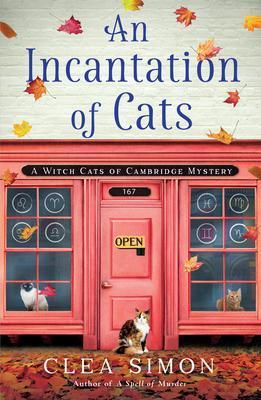
The new novel in Clea Simon’s spellbinding Witch Cats of Cambridge series! When two new clients seek Becca’s professional services, the fledgling witch detective is overjoyed. Finally, she can use her skills to help her magical community. But as the young witch finds the new cases intertwining, things grow more complicated. Becca’s three cats – the ones with the real power – can smell something is wrong with these clients. But not even Clara, the calico, knows what to do when a man ends up dead and a powerful and poisonous root appears – and disappears – in the case. To make matters worse, Clara and her littermates are feuding – and she can’t tell them about an unsettling interaction she’s had with one of the client’s sisters. Is it possible that some humans may have the same powers as the magical felines? What does that mean for Clara’s beloved Becca – and for the potent poison that has already taken one person’s life? In this second Witch Cats of Cambridge mystery, Clara and her sisters must learn to work together if they are to save the person they all love.
May 7, 2020
Bookshelves of the Rich and Famous
Is there a lighter side to this odd and horrible time? Just maybe – in the peek it has allowed us into the homes of celebrities. (This piece ran in the Boston Globe.)
OPINION
Bookshelves of the rich and famous
Was that ‘Pride and Prejudice’ on Amy Klobuchar’s shelf? Did I recognize the Oxford World’s Classics editions of Anthony Trollope behind actor Paul Giamatti?
By Clea Simon May 6, 2020, 28 minutes ago
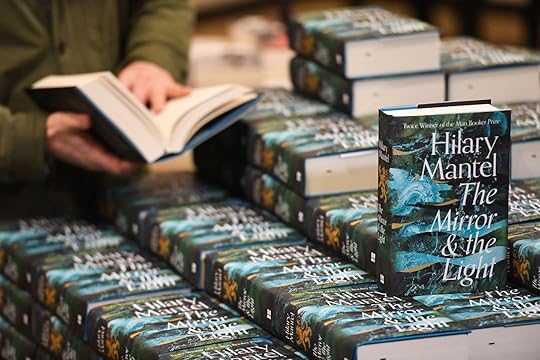 “The Mirror & The Light” is the final book in Hilary Mantel’s Wolf Hall trilogy.PETER SUMMERS/GETTY
“The Mirror & The Light” is the final book in Hilary Mantel’s Wolf Hall trilogy.PETER SUMMERS/GETTYWhen Stephen Colbert interviewed Mayor Pete Buttigieg last week on “The Late Show,”I squealed with delight. Not because the former presidential candidate had anything much to say but because behind him, half out of sight, I recognized the distinctive vine-crossed dark blue cover of Hilary Mantel’s “The Mirror and the Light,” her monumental new novel about the fall of Henry VIII’s advisor Thomas Cromwell. My night was made.RELATED: Hilary Mantel’s Cromwell comes full circle
This wasn’t the first time I’ve found myself more interested in the backdrop than the foreground. If there are any benefits to this odd and horrible time of the coronavirus, it is in treats like the unexpected appearance of Mantel’s book. As talk show guests and news talking heads broadcast from their homes, more often than not we get to see those homes — and, increasingly, their bookshelves. Although some celebrities have been interviewed in their kitchens or bedrooms, the living room or library has become the remote default. There’s less chance of an embarrassing cameo by a nude family member if you’re backed up against the hardcovers. Plus, bookshelves convey a sense of literacy, even when the subject is commenting on the latest streaming binge or guilty pleasure.
Like the “Easter eggs” hidden in a movie or video game, these shelves also give us book lovers a little extra context. They are private space made public, inviting us to read into what the stars read. Many of these shelves are packed with political biographies (I’m pretty sure I spotted Winston Churchill on Buttigieg’s and LBJ on Colbert’s) or cultural touchstones (Trevor Noah’s shelves showcase Ta-Nehisi Coates and President Obama while his correspondent Roy Wood Jr. has both Obama and “All the Pieces Matter: The Inside Story of The Wire” on his). The intersection of interests here is obvious. Politics as well as entertainment that address issues of race are key to what these entertainers do professionally, whether at home or in a studio.
But what about the more obscure choices? Was that “Pride and Prejudice” on Amy Klobuchar’s shelf? Did she pull it down for a fictional escape, as her husband battled the coronavirus? Did I recognize the Oxford World’s Classics editions of Anthony Trollope behind actor Paul Giamatti? “The Way We Live Now” or “Is He Popenjoy?”? Trollope’s musings on wealth and power would certainly make sense as the actor finishes up a season of “Billions.”
Such speculation may be moot. This moment of unintentional candor is already, apparently, passing. Increasingly, celebrities seem to be staging their shelves — remaking their private space for the public eye again. On her “Full Frontal” this past week, Samantha Bee pointed out some notable examples of public figures prominently displaying their own books behind them as they were interviewed — the visual equivalent of mentioning the title, the full title, as often as possible. (A trick I was taught during media training for my own first book, and which I performed to the extent that the host of one public radio show told me, during a break, to tone it down.) As a punchline, Bee displayed her own book, which she had hanging from a tree beside her in her backyard.
For the moment, we still have some opportunities for candid browsing. That copy of the Mantel, for example, wasn’t shelved behind Buttigieg or even prominently displayed. The book was simply lying on an end table, half out of sight. If you didn’t know the cover already, you probably would not have recognized it, which led me to wonder if Buttigieg or his husband might have been reading it before the camera — or the Zoom call — turned on. And that makes me want the next interviewer to ask Buttigieg what he made of that great political drama. What he’s really like, once the camera is turned off.
Clea Simon’s most recent novel is “An Incantation of Cats.” She can be reached at http://www.cleasimon.com
May 3, 2020
#NoContact Book Tour with Nina MacLaughlin
Be careful what you wish for. After the publication of Nina MacLaughlin‘s masterful Wake, Siren last fall, I was lucky enough to attend a reading at Harvard Book Store, where she brought several of these profound and stunning pieces – retellings of Ovid’s Metamorphosis from the women’s (nymph’s, etc.) point of view – to life. I then found myself reading various essays she’d written and was thrilled to hear that they were going to be published by Black Sparrow Press. Only… in this odd, horrible time, that means Nina has a new book out and I don’t get to hear her read from it (not in person, anyway). So, until that day, I’m proud to welcome her here for a #NoContact book tour.
Tell us about your book!
For the Paris Review Daily I wrote a series of essays on the summer solstice. This book, published by the legendary Black Sparrow Press in this beautiful letterpress edition, is an expanded version of those essays. It’s a meditation on summer, on ritual, on the experience of the warmer months of the year, and the oppositions – light dark; winter summer; life death – held inside the solstice moment itself.
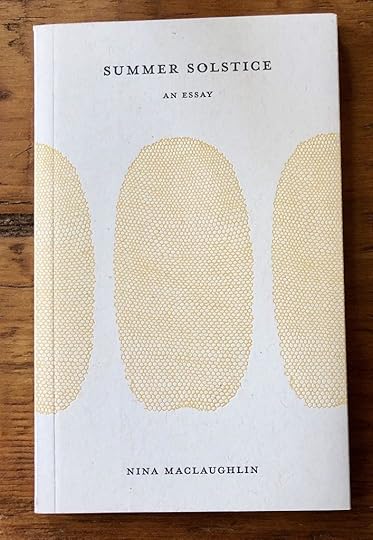
What would you have been doing now to promote it? Where would you have been speaking? What bookstores would you have visited?
The launch event would’ve taken place at the mighty Brookline Booksmith, one of the great bookstores of the area. They were able to host a virtual launch instead, and though it would’ve been great to cram into the store and see everyone’s faces in person, doing it all through a computer screen ended up being a real pleasure — and allowed people to tune in who definitely wouldn’t have been able to make it to Brookline!
I’m hoping to reschedule events that were lined up at Partners Village Store in Westport, Massachusetts in conversation with the writer and artist Ben Shattuck; at the lovely Water Street Bookstore in Exeter, New Hampshire; and NorthshireBookstore in Vermont.
Are you working on anything now? Is your process or routine different?
Halted on research on a next possible book project (no access to the archives), I’ve been working on a series of essays about the sky. The process and routine feels more or less the same; what feels different is the pace and the new brain muscles involved. My mind feels muddy and the work is going slowly. I’m trying to think of this as a time to let it rip in a different way, to see what comes out, to be patient, and to know that the work is going to look and feel a little different these days. It’s been more challenging than usual, focus-wise, precision-wise.
Do you think your writing will be changed by this crisis?
It’s a good question, and an impossible one for me right now. I’m trying not to think of any beyond right now. I’m trying to aim my attention in the very short term, the hours of the morning, the afternoon, the evening. Our experiences alter the ways we approach our work, alter where we aim our attention, so in some ways, inevitably, yes, this crisis will surely impact the work. This is the moment we are living through right now — how it will be digested and how it might change things, I hope we will see.
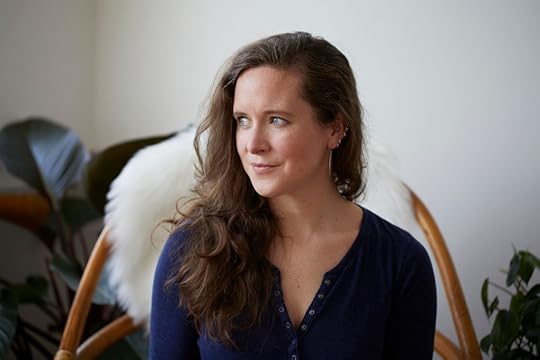
What’s the first thing you’re going to do when we’re free to be social again?
There’s a couple people who I really, really, really want to hug.
Me too, Nina! Stay safe – and let’s plan on some big hugs in the future.
April 30, 2020
Missing Malice and so much more
Hi, all! How are you? I know you can’t see me, but I am waving madly at you all from my home in Somerville, Massachusetts.
As I write this, Gov. Baker of Massachusetts is extending the stay-at-home advisory from May 4 to May 15. This isn’t a surprise – it looks like we may have flattened the curve, but we’re still going at a level of approximately 1,700 new cases and at least 100 deaths per day here. If anything it’s a relief.I want sensible, science-based decisions. I want us all to be safe.
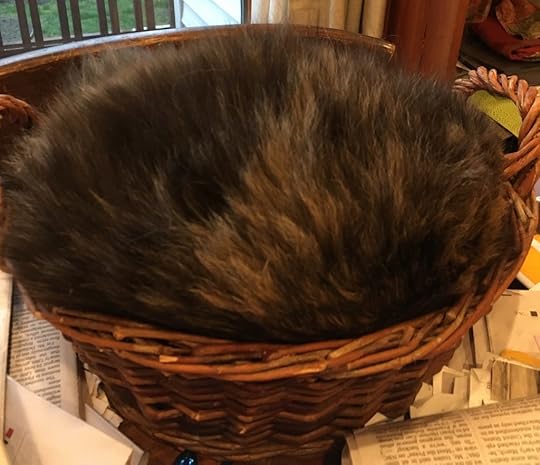 Thisbe sheltering in place.
Thisbe sheltering in place.That doesn’t mean I’m not missing so so much of what i fondly think of as the real world. Malice Domestic, for example, was supposed to start this weekend. Malice, as its fondly abbreviated, is the annual gathering of traditional (aka “cozy”) authoThirs and fans for four days of panels, chats, a bang-up banquet, and a traditional closing tea, at which almost everyone sports the most amazing hats. It’s a joyful rite of spring, a chance to greet friends. It’s also run by volunteers who work their butts off. And while I applaud their wisdom and caring in cancelling this year’s festivities, I am sorry. Here’s hoping that everyone stays safe and well and we can gather next year!
I ‘m also missing my usual writing rigor. Back in the pre-COVID days, I’d think nothing of daily word count minimums of 1,500 words a day (or more). Often I’d whiz past them, making myself stop at some tense point so the next day’s writing would kick off with a bang. These days, I’m pushing myself to write 750 (“it’s the new 1,000 words,” I told a friend). And my plotting/planning brain? Well, let’s just say I’m going to have to do a lot of revising.
I know I’m not alone in this. I’ve been lucky enough (at least until recently) to still have some freelance work, and that included covering several Zoom panels hosted by Harvard’s TH Chan School of Public Health on COVID-related stress and insomnia. I also just read an article naming the exhaustion from ongoing stress: allostatic load or, really, overload.
I find I’m visualizing my current state as an iceberg. Usually, I figure, our conscious thought process is that tip of the iceberg – the bit above the surface. The huge majority of the ice, beneath the surface, is the unconscious or semi-conscious, where all our dreams take place. That, I believe, is also where a lot of our creativity comes from – those connections that (used to) hit me in the shower or on a long walk. The “of course! She finds the weapon in the shrubbery because the murderer was the gardener!” moments. Now, however, our internal seas are so riled up that even as we are apparently coping, our underwater bits are in a state of constant screaming. The static of panic is taking up the space where our inspiration usually flourish.
So, to further mix my metaphors, how to weed that garden, or at least till the soil? Well, for me, daily discipline is a tonic. I may not be writing a good 750 words, but I am writing them. And I’ve also just completed a short story, which cheered me immensely (that I got it done, not that it’s that brilliant). As I emerge from the initial shock, I’m also signing up for online readings and events – please join me for a reading and book chat on Tuesday, May 12 at 5p.m. EST for a Teatime Reading and possibly a virtual Noir at the Bar later in the month (probably Wednesday, May 27, but please check my events page closer to). I may even have some book news soon.
Is this our new normal? I don’t want it to be. But I’m carrying on and very much hope you are as well. Would you like to share your stories with me? I’d love to hear them. Not as much as I’d love see you all, of course. Till then, my friends, stay safe. Take care of yourselves and those you love. We will meet again.
April 26, 2020
#NoContact book tour with Tilia Jacobs
Welcome to the #NoContact Book Tour! While we all stay inside and stay safe, books have become even more important. But book events and conferences, alas, are canceled – as are most schools!. With that in mind, I’m particularly honored to have Tilia Klebenov Jacobs here to tell us about her new venture – into middle-grade fantasy, with Casper and Jasper and the Terrible Tyrant! What a treat for kids stuck in the house (and the parents trying to home-school them).
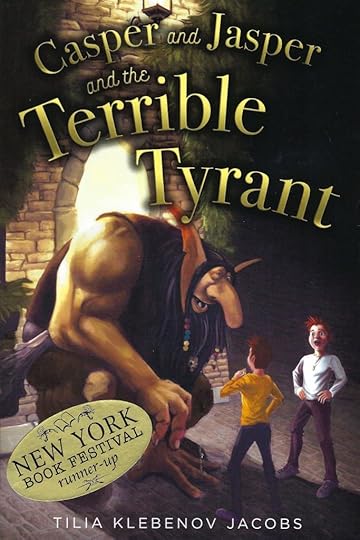
Tell us about your book!
My most recent book is Casper and Jasper and the Terrible Tyrant. If you think that sounds like a middle-grade fantasy story, you’re right! You see, after two crime novels, I wanted to write something my kids were allowed to read.
Casper and Jasper are fast-talking, twelve-year-old twins who discover that their parents, long believed dead, are in fact rebels being held by the evil Count Wilhelm Scream. When Casper and Jasper set out to rescue their parents—with no actual evidence that they are alive, by the way—the boys stumble into a land of werewolves, trolls, and carnivorous marshmallows.
What would you have been doing now to promote it? Where would you have been speaking? What bookstores would you have visited?
I was scheduled for a bunch of author events, including the first annual Worcester Book Festival. I’ve been lining up the second Natick Mystery Day, a coordinated event between Mystery Writers of America-New England and the Natick Farmers’ Market. I was talking to a high school classmate who is now a fifth-grade teacher about visiting her class, since she read the book out loud to her students, who loved it. Plus, I was going to teach a multi-week writing class in Framingham, and I do feel it’s legit to mention my books on the first day so people know I got chops. Oh, the list goes on and on! I truly didn’t realize how much I had lined up till it all went poof.
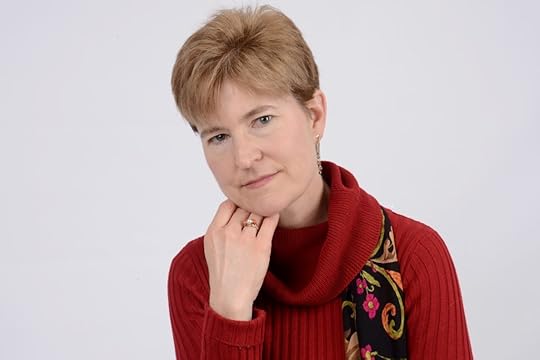
Are you working on anything now? Is your process or routine different?
Yes! I just started taking a marvelous, online course on dialogue, and it has nudged me into writing bits and pieces for a possible new crime novel. This just started, and I can tell you, it feels great to be working again.
I am also in the editing phase for a short story that is slated to appear in the MWA anthology A Stranger Comes to Town in April, 2021. This is a really exciting project for me, and I’m honored to be part of it.
As for my process and routine being different, well, isn’t everything different now? Put it this way: I have two kids, a husband, a dog, an Internet connection, and laundry to fold. Ordinarily I don’t even try to write from home. Instead, my muse and I meet up at coffee shops and public libraries. (Heavens, I miss libraries….) Now, however, is not ordinarily. Now I do my best to write at home, and my family, God bless them, do their best to let me, but even with their support and encouragement, it’s really difficult. If I’m writing at home, I’m acutely aware of the fact that innumerable, valid chores beckon me with their siren song. Making the sirens shut up and leave me alone is a serious challenge. I have no magic for making this easier. I just have to power through it, reminding myself that whatever small amount of work I get done is better than no work at all.
Do you think your writing will be changed by this crisis?
No idea. I expect that many of us who lived through this will emerge from it very grateful for any number of things we used to take for granted, so perhaps that will color our writing in the future. On the other hand, others may be so eager to move past this difficult time that they do their best to erase any thought of it from their minds and their artistic expression. The 1918 flu pandemic, which was caused by a virus in the same family as COVID-19, left almost no cultural traces behind when it vanished: no significant plays, novels, movies, songs, or anything else that I’m aware of, which is passing strange when you consider that it killed somewhere between seventeen and a hundred million people. So really, it’s anyone’s guess.
What’s the first thing you’re going to do when we’re free to be social again?
Honestly, it almost hurts to think about that. Even though my family is one of the lucky ones (healthy so far, and able to weather the storm), it reminds me of how much we’ve lost, at least for the moment.
I think the first thing is to take my kids to spend the day with their grandparents, who are currently on lockdown at their retirement community. (Not allowed out of their apartment, and certainly no visitors.)
Then I want to find a neighborhood restaurant and go out to dinner with my husband. We will tip lavishly.
Then we will visit with friends, and remark endlessly how nice it is to see faces in 3D.
I want to see a play, not a movie, though we will see movies too; but I want to see live actors on stage, and give them the joy of an audience laughing and crying and clapping for them.
I have a list of places to go and people to see. So does everyone. We will get together when this is over!
April 23, 2020
#NoContact book tour with Victoria Zackheim
Welcome to the #NoContact Book Tour! While we all stay inside and stay safe, books have become even more important. But book events and conferences, alas, are canceled. So today I am thrilled to welcome Victoria Zackheim, whose Private Investigations: Mystery Writers on the Secrets, Riddles, and Wonders In Their Lives is out this week. No, I’m not in it. But there are so many great writers who contributed, I know I want to read it!
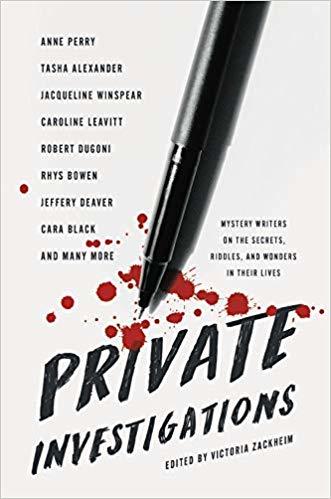
Tell us about your book!
PRIVATE INVESTIGATIONS: Mystery Writers on the Secrets, Riddles, and Wonders in Their Lives
is an anthology of bestselling mystery writers who “abandon the cloak of fiction” and write about the secrets in their own lives. What have they experienced? How did they cope? What are the enigmas, mysteries, thoughts that keep them up at night? Jeffery Deaver writes about how he almost abandoned writing…imagine! Caroline Leavitt recounts when she lost her voice and doctors couldn’t find a cure; Martin Limón travels back to his military stint in Korea to grapple with the crimes of war, while Anne Perry ponders the magical powers of stories conjured from writers’ imaginations. From haunted houses to spiritual journeys to peeping Toms…and the experiences of living through war and family secrets…these writers open their lives to us and remind us that we’re all private investigators, when it comes to our own real-world dramas.
What would you have been doing now to promote it? Where would you have been speaking? What bookstores would you have visited?
As with all of my books, readings were scheduled at bookstores, an exciting appearance (with many of the contributing authors) at Bouchercon 2020…all cancelled. We were going to read at Book Passage in Corte Madera https://www.bookpassage.com/ The virus struck before other readings/events could be finalized. Alas.
But…generous and loving support has come from bloggers (like you!), so perhaps someone out there will learn about the book.
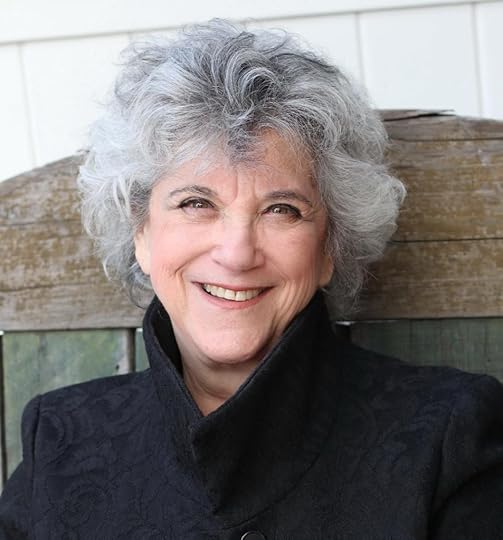
Are you working on anything now? Is your process or routine different?
I’m working on several projects. First, my online course in the UCLA Extension Writers Program is in its third week, and my students are very enthusiastic. I think we’re all happy to have that human contact, even if it’s online and “distanced”… I’m about to open the file sent by my editor and begin what I hope are the final edits of my novel. I’m also completing a screenplay with a Texas-based writer, so little changes there. What seems to be interrupting my process is my struggle with all the emotions we’re experiencing: worry, fear, frustration, hope, loss of hope, anger. It’s the unknown that I find difficult.
Do you think your writing will be changed by this crisis?
I don’t think so, but the energy that gets me writing/editing/teaching has certainly been affected. Will we ever return to “normal”? Or will “normal” be redefined forever? I can’t say. I wish I knew
What’s the first thing you’re going to do when we’re free to be social again?
That’s the easiest question you’ve asked! I’m going to hug my grandchildren and cover them with kisses. I haven’t been closer than ten feet to anyone for four weeks. A visitor stops at the bottom step and I’m standing inside the house…no touching, no closeness. Brutal. Bring on the hugs!
April 20, 2020
“The King of Warsaw” review
My review of Twardoch’s brutal, moving novel ran in the April 19 Sunday Boston Globe.
BOOK REVIEW
‘The King of Warsaw’ is a Holocaust novel with a twist
By Clea Simon Globe Correspondent,Updated April 16, 2020, 12:00 p.m.
Jakub Szapiro knows about the road not taken. The putative protagonist of Szczepan Twardoch’s heartbreaking “The King of Warsaw,” Szapiro is living with the results of choices made decades earlier, when he embodied this novel’s title, as a champion boxer working as an enforcer for a crime lord in 1937 Poland.
When we first meet Szapiro, he is 37 and in his prime, a beautiful, sexy man beloved by the crowd, valued by his boss, and the father of two young sons, whom he adores. The star heavyweight of the Jewish Maccabi club in the main event of the capital’s team championship, he is facing off against an Aryan boxer, whom he quickly and efficiently dispatches. With anti-Semitism on the rise, Jewish Warsaw rejoices.
It is this scrawny youth who is purportedly writing this recollection from the vantage point of 50 years later, when, as a retired Israeli army officer, now calling himself Mojzesz Inbar, he has learned a thing or two about fighting and the cost of violence. Or has he? These three narrators — Szapiro, Bernsztajn, and Inbar— alternate and, at times, merge, playing out a personal tragedy on the cusp of genocide.
The Holocaust looms large in “The King of Warsaw,” although not every character has the perspicacity to see it. Emilia, Szapiro’s common-law wife, is one of the more aware. She wants to emigrate to Palestine and raise their sons in Tel Aviv, but Szapiro dismisses her fears: “I’m not a Jew,” he says. “I’m Szapiro. And Warsaw is our city.” To Bernsztajn, Szapiro is apparently correct. Through his eyes, the reader sees the ridiculous privilege of Szapiro’s life, including unfettered access to a beautiful Polish woman and the undying dedication of one of his exes, now a madam at the gang’s favorite brothel.
Of course, not everything is as it initially appears in this work, the first of the noted Polish author’s to be translated into English. In Twardoch’s world, the brutality is constant, with killings and dismemberments recounted in almost loving detail. It is also, as translated from the Polish by Sean Gasper Bye, often poetic. A man being tortured “began to focus intensely on the taste of the mouth of a certain boy he’d spent a heady two weeks with in Rome last year, the taste of wine and pasta … the soft hands of his mother, Aurelia Bobinska, née Rataj; then he suffered much, and then he died.”
As that passage suggests, for all its physicality, this novel also has a dreamlike quality, with the logic of an especially grim fairy tale. When Bernsztajn says, early on, “I am not a person,” it may make sense to believe him. Likewise, attention should be paid to his vision of a sperm whale with burning eyes that he sees floating above the city, “moving his powerful, muscular bulk slowly, his mighty head brushing the roofs of the apartment houses, knocking off a few tiles.” The whale — a hallucination or the manifestation of something yet to come? — “touches something inside me I would rather remain hidden,” the narrator says. “Yet all will be laid bare.”
Before this happens, in a stunning final twist, there is a lot of ground to be covered. Some of it, in this 400-plus-page book, is hard going. Szapiro’s world is populated by a multitude of unsavory characters, from politicians, journalists, and unlucky civilians to one of the more memorable psychopaths of contemporary fiction: Pantaleon Karpinski, whose long hair hides a second face — his “devil brother” — on the back of his head. Their savagery is constant and, even with the beauty of the writing, can be hard to stomach. In addition, the many names, as well as the characters’ propensity for lapsing into Yiddish (translated in footnotes), can make this a difficult book to climb into, even before the unreliability of the various narrators becomes apparent.
As the lumbering beast of Bernsztajn’s imagination approaches with all the weight of history or fate, the scope of the tragedy becomes clear. For those who hang in, the revelations are cathartic, tying all the raw and bloody ends together at last with a beautiful, fierce justice.
THE KING OF WARSAW
By Szczepan Twardoch
Translated from the Polish by Sean Gasper Bye
Amazon Crossing, 416 pp., $24.95
Clea Simon is the author of “An Incantation of Cats.” She can be reached at www.cleasimon.com



